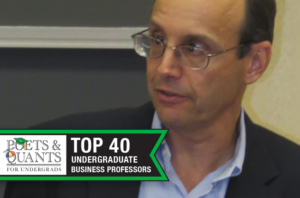Kevin Michels
Professor and Director of the School of Business Center for Innovation and Ethics
The College of New Jersey School of Business
The annual tradition at The College of New Jersey (TCNJ) is for graduating seniors to nominate a member of the school’s faculty to deliver a keynote address. One year ago, that honor was bestowed upon Professor Kevin Michels. Michels teaches courses in law, ethics, and innovation and is the director of the business school’s Center for Innovation and Ethics. As a law expert and a former law practice director, Michels also publishes frequently. His work has been published in the Rutgers Law Review, the Georgetown Journal of Legal Ethics, and the Case Western Reserve Law Review. He’s also the author of New Jersey Attorney Ethics, a treatise on the law of lawyering in New Jersey, which has been cited in the published opinions of state and federal courts in New Jersey.
Inside the classroom, he is known for incorporating a unique presentation style in his lectures; rarely using any form of technology such as powerpoint slides and instead centering class time around dialogue and discussion. Michels has received two teaching awards at TCNJ.
Age: 56
At current institution since: 2006
Education: BA, History/Political Science (Double Major); Philosophy Minor, Rutgers College 1983; JD, Rutgers Law School — Newark, 1986
List of courses currently teaching: Innovation, Business Ethics and Corporate Social Responsibility, The Legal Environment of Business
Fun fact about yourself: Loves innovation but revises drafts with a fountain pen
“If I weren’t a business school professor…” I’d be writing articles and books anyway
“One word that describes my first time teaching…” Conversation
What do you enjoy most about teaching undergraduate business students? Sparking curiosity, original and deep thinking; the beauty of conversation designed to learn from each other; and the capacity to change one’s mind in the presence of a better reason.
What is the biggest challenge that comes with teaching undergraduate business students? Helping them see business as part of the larger human enterprise.
What does a student need to do to get an A in your class? Think deeply and originally and express those thoughts clearly.
What are your hobbies? Writing, reading, golf, hiking, tennis, and guitar.
How did you spend your summer? Teaching law students to be agents of change at Gonzaga Law School.
Favorite place to vacation: Pacific Northwest
Favorite book: The five that I have out from the library at any given time
Favorite type of music and/or favorite artist: Classical, blues and indie, depending on the moment
Bucket list item #1: Rent a house with family and friends in Augusta, Ga. for Masters week
What professional achievement are you most proud of? Election to the American Law Institute
What is your most memorable moment as a professor? The first class I taught — within minutes we were engaged in conversation rather than lecture.
Professor you most admire and why: Doug Husak, Rutgers Philosophy. He showed me the power of an interesting problem and the joy of working it carefully.
What are you currently researching and what is the most significant discovery you’ve made from it? I am writing a book on innovation, which proposes a way to connect knowledge from various disciplines to create something new.
“If I had my way, the business school of the future would have much more of this…” Courses and centers on innovation and value creation that have genuine connections with the liberal arts and other professional schools.
Looking ahead 10 years from now, describe what “success” would like for you: Personally — Lots of time with family and friends; Professionally — Still on fire with ideas and possibilities
Students say…
“It should be noted that there are never enough words nor ways to express my gratitude for this individual in helping me become a better thinker, writer, and global citizen. His contributions to higher education are incalculable, and certainly transcend the general expectations of college students.”












Questions about this article? Email us or leave a comment below.